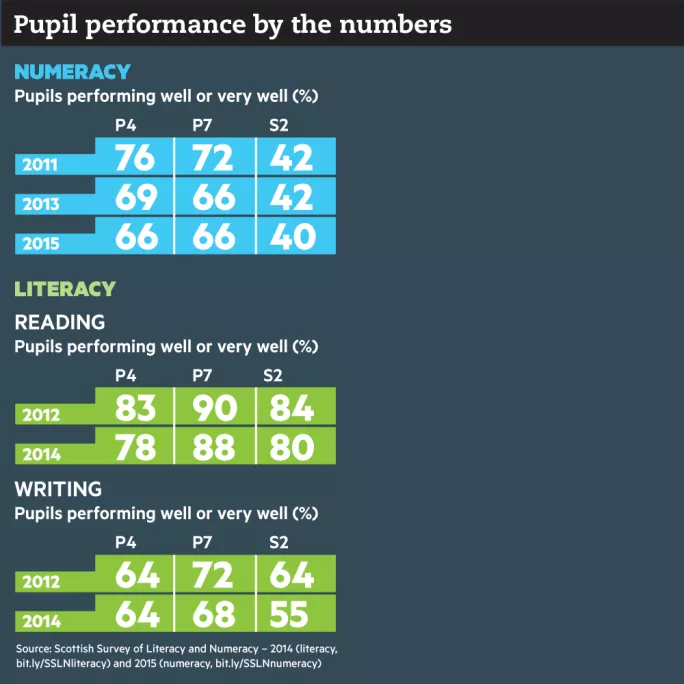SNP under fire for dropping pupil-performance survey

The Controversial national survey of pupil performance is to be scrapped next year.
Earlier this year, the SNP was accused of trying to bury the results of the Scottish Survey of Literacy and Numeracy (SSLN) ahead of May’s election (see box, below). Now TESS can reveal that the survey will run for the last time this year, with the final set of results to be published in 2017. The move has been attacked by experts - including a key government adviser.
Professor Louise Hayward, the only academic sitting on the government group tasked with taking the National Improvement Framework (NIF) forward, questioned how progress would continue be measured without the survey.
It is the NIF - and its controversial standardised tests in literacy and numeracy - that the government argues will replace the SSLN, thereby ensuring that it continues to have information on pupil performance in these areas.
But experts say that it will take five years for the NIF to bed in and, in the meantime, the Scottish government will not know if its flagship policy aimed at closing the attainment gap - to which it has committed hundreds of millions of pounds - is making any headway.
First Minister Nicola Sturgeon has vowed to make “significant progress in closing the attainment gap” - between disadvantaged pupils and their peers - over the course of this Parliament and has committed £750 million to that end.
‘Left in the dark’
However, Keir Bloomer, chair of the Royal Society of Edinburgh’s education committee, said: “It will not be possible to compare the results from the new source with that from SSLN and be able to say whether progress is being made.
“It will be at least five years before trends will be apparent in the new information. Thus, there will be no evidence of this kind for the next few years to allow us to say whether the gap is closing or not. I would have thought this would concern the government.”
Mr Bloomer’s views were echoed by assessment expert Professor Hayward, of the University of Glasgow’s school of education. She added that without the SSLN - a sample survey reporting on literacy and numeracy in alternate years (see box, below) - Scotland would not know whether any improvement shown through the new regime of standardised assessment was genuine.
It might appear that results are improving, but this could be because schools and teachers alike are getting better at rehearsing pupils for the tests, she said.
Professor Hayward would like to see the SSLN updated and continued for the foreseeable future, she told TESS. The Scottish government said it had cost £774,000 to run the survey in 2014-15 - but Professor Hayward argued this was money well spent.
“Even when you have years of information [from standardised assessments], unless you have a touchstone like a national survey you don’t know whether what you think is improvement actually is, or whether what you are actually seeing is that, over a number of years, teachers have got better at rehearing young people for the tests,” she said.
“Our evidence from the 5-14 testing system tells us that you can have scores improving year-on-year but without improvement.”

Mr Bloomer callrf for the NIF and the SSLN to be run in parallel for at least four years. He suggested that the government was getting rid of the SSLN because the results were getting worse (see graphic, above).
In May, the SNP was accused of burying the results of the SSLN. It decided to publish them after the Parliamentary election on 5 May, when traditionally the results have been published in March or April.
‘Continuous decline’
Speaking about the decision to discontinue the survey, Mr Bloomer said: “Some people may suspect that the fact that SSLN results have been showing continuous decline has been a factor here.”
Lindsay Paterson, professor of education policy at the University of Edinburgh, described the decision to scrap the SSLN as “extraordinarily philistine”, adding that “we will then know nothing educationally useful at all about the state of Curriculum for Excellence”.
A long-standing criticism of Scotland’s new curriculum is that there has been no research put in place to evaluate its impact.
A spokesperson for the Scottish government said that the SSLN provided useful national information but “did not provide detailed local- and school-level breakdowns”. The NIF would provide new data on literacy and numeracy, which would “highlight the attainment gap and where it occurs”, he said.
He added: “From 2017-18, teacher professional judgement will be informed by the new national standardised assessments.”
You need a Tes subscription to read this article
Subscribe now to read this article and get other subscriber-only content:
- Unlimited access to all Tes magazine content
- Exclusive subscriber-only stories
- Award-winning email newsletters
Already a subscriber? Log in
You need a subscription to read this article
Subscribe now to read this article and get other subscriber-only content, including:
- Unlimited access to all Tes magazine content
- Exclusive subscriber-only stories
- Award-winning email newsletters